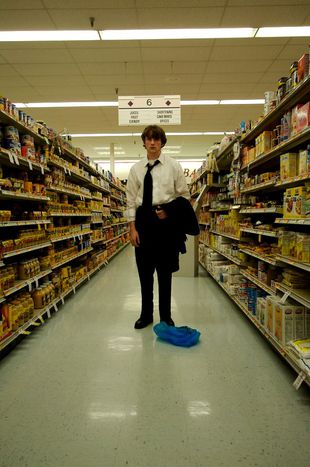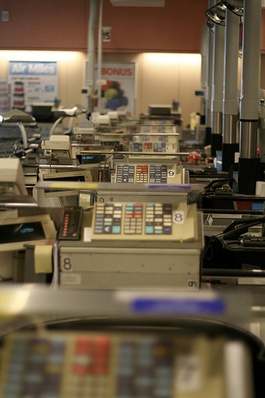
Dutch supermarkets at war in Europe
Published on
Translation by:
Joss CornerSpecial offers, two for the price of one, price-cuts, buy one get one half price, loyalty cards, vouchers… are you familiar with these methods of seduction? Supermarkets are engaging themselves in heightening competition to the point of declaring war on one another, such as in the Netherlands, where leading brand names are selling at a loss
They resort to all possible means imaginable to secure the loyalty of their customers. Each one tries their hardest to develop a distinctive business model which can take several forms: guaranteeing permanent low prices or a torrent of temporary promotions, aisles carefully stacked or boxes of goods simply placed on the floor…Started in 2003 and ferociously pursued ever since, the price war between Dutch supermarkets is characterised by promotions based on a reduction of the sale price to below the buying price. The commercial directors assess that once a client attracted by a special offer visits the store, they will undoubtedly buy other products.
Albert Heijn
 Returning to the war of the brand-names: Albert Heijn, the Dutch market leader with a share of 30%, is considered to be the initiator of this escalation. In 2003, it had already launched a competition to rival supermarkets as well as pharmacies by carrying out price-cuts on a whole range of products, respecting its promise to offer the lowest prices. This chain of supermarkets is continuously inventing new promotional campaigns to ‘steal’ their rival’s clients, often with success. The latest: football cards which allow customers’ children to collect the photos of all the players in the Dutch championship. And this was a success, judging by the crowds at the tills.
Returning to the war of the brand-names: Albert Heijn, the Dutch market leader with a share of 30%, is considered to be the initiator of this escalation. In 2003, it had already launched a competition to rival supermarkets as well as pharmacies by carrying out price-cuts on a whole range of products, respecting its promise to offer the lowest prices. This chain of supermarkets is continuously inventing new promotional campaigns to ‘steal’ their rival’s clients, often with success. The latest: football cards which allow customers’ children to collect the photos of all the players in the Dutch championship. And this was a success, judging by the crowds at the tills.
Sale at a loss: a ban?
Its rival Jumbo, which has undergone an unrivaled expansion over all regions of the Netherlands since 2008, adopts a completely different style of marketing. There are never promotion nor temporary price reductions on its stock, because all the products are always sold at technically the lowest price possible, given their buying price. ‘This means that all our products are on promotion every day,’ explains Frits van Eerd, general manager of the family business, on a talk show. In fact, taking into account the fact that Dutch supermarkets are on average 11% cheaper than their Belgian counterparts, we notice very quickly that the savings are worth a detour for the Belgian next door. The supermarkets near the Belgian border are stormed.
But where does this price difference come from? A general reduction in all sales outlets in the Netherlands has led to this aggressive competition. Sale at a loss, for example, which is a technique frequently employed by the ‘warrior’ supermarkets in the Netherlands, is against the law in Belgium.
A general reduction in all sales outlets in the Netherlands has led to this aggressive competition
Besides, the European parliament has recently declared itself in favour of banning the practice for all food products inside the community. The big chains in other European countries are also familiar with the price war. For example, in France, the hypermarket chain Carrefour is one of the most aggressive retailers in terms of cutting prices. But that never comes without a price. Research carried out on a national, as well as European, level has shown that this price war has detrimental effects on small businesses incapable of withstanding the pressure and which are forced, consequently, to make staff redundant.
The pressure exerted on the costs of staff and the risk of poor quality products are also worrying subjects.
However the situation might be, a ceasefire is completely out of the question for the moment. Who gets the booty? And who will be the next victims? One thing is for sure: the customers have only the fruits to reap from these attacks, as much from the buying power as from the abundant choice of produce.
Translated from Les supermarchés se font la guerre en Europe



